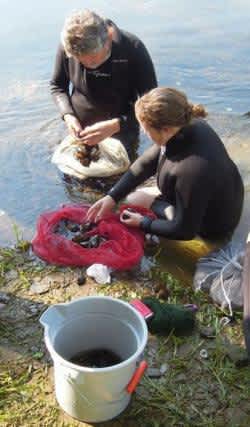Pennsylvania Mussels Used to Restore Streams in Ohio, Illinois and West Virginia
OutdoorHub 09.05.12

A joint effort between federal and state agencies, including the Pennsylvania Fish and Boat Commission (PFBC), has resulted in the successful collection and relocation of approximately 4,000 state and federal endangered northern riffleshell mussels from a site on the Allegheny River along the border of Forest and Venango counties.
The mussels – collected over a two-day period Aug. 21-22 – were expected to be adversely affected by the Hunter Station Bridge replacement project, located along State Route 62 in Tionesta, Forest County. When the project begins, cofferdams and causeways will be constructed in the river and the old bridge will be dropped. These actions would likely have killed thousands of the mussels, but the salvage efforts have been able to save the resource and put it to use in other states. (Photo courtesy Jim Carroll/PennDOT).
“The mussels have been transported to Illinois, Ohio, and West Virginia, where they will be used to strengthen existing northern riffleshell populations and to establish new populations in some of the waterways where they historically occurred,” said PFBC biologist Jordan Allison, who assised with the recovery. “These efforts are being monitored carefully to ensure that the reintroductions are successful, and the information gathered will be used to further species recovery efforts in the future.”
States and provinces in which the northern riffleshell can be found include: Illinois, Indiana, Kentucky, Michigan, Ohio, Pennsylvania, W.V., and Ontario. However, in recent years, the number of northern riffleshell populations outside of Pennsylvania has decreased significantly.
“The middle Allegheny River contains the world’s most extensive known population of northern riffleshell,” Jordan added. “Though it is listed as an endangered species in Pennsylvania, the population at this site has been identified as a source of animals for species recovery efforts due to the planned replacement of the Hunters Station Bridge.”
The U.S. Fish and Wildlife Service (USFWS) led the recovery effort through its field offices in Pa., Ohio, and W.V. and its Ohio River Islands National Wildlife Refuge. Other partners included the PFBC; Pennsylvania Department of Transportation; Columbus Zoo and Aquarium’s Freshwater Mussel Conservation Facility; Illinois Natural History Survey; Illinois Department of Natural Resources; and W.V. Department of Natural Resources.
Mussels are an integral part of a healthy ecosystem providing humans and other animals with many services free of charge. Mussels are filter feeders, meaning they obtain food by taking in gallons of water per day to filter out suspended particles leaving the water in our streams and rivers clearer. Live and dead mussel shells provide many aquatic organisms with habitat that is necessary for their survival. Mussels also serve as food for some species of birds, mammals, reptiles, and fish.
“Throughout the world, mussels are the most imperiled group of organisms,” said PFBC malacologist Nevin Welte, who specializes in the study of mollusks. “At one time in the U.S., there were nearly 300 different species of freshwater mussels. Of these, 67 were known to be from Pennsylvania. Currently, 54 species of mussels remain in the state, representing a 19% loss in the number of mussel species that historically occurred within our borders.”
Of the 54 species remaining, seven are on the Pennsylvania endangered species list, and two are on the Pennsylvania threatened species list. Freshwater mussels have declined due to water pollution, changes in water quantity (floods, drought, dams, and irrigation), loss of habitat (dams, dredging, waterway channelization, and bridges), and competition with invasive species such as the zebra mussel.
“Along with our partners, we are hopeful that establishing new populations of northern riffleshell in multiple states will be a large step forward in promoting the recovery of this species,” said Welte, who notes that current state regulations prevent the collection of any freshwater mussels from waters of the Commonwealth and state and federal regulations prohibit the unauthorized collection of endangered species.
For more information about the freshwater mussels, please visit our website at the following link: www.fishandboat.com/anglerboater/2012ab/vol81num2_marapr/06mussels.pdf.

